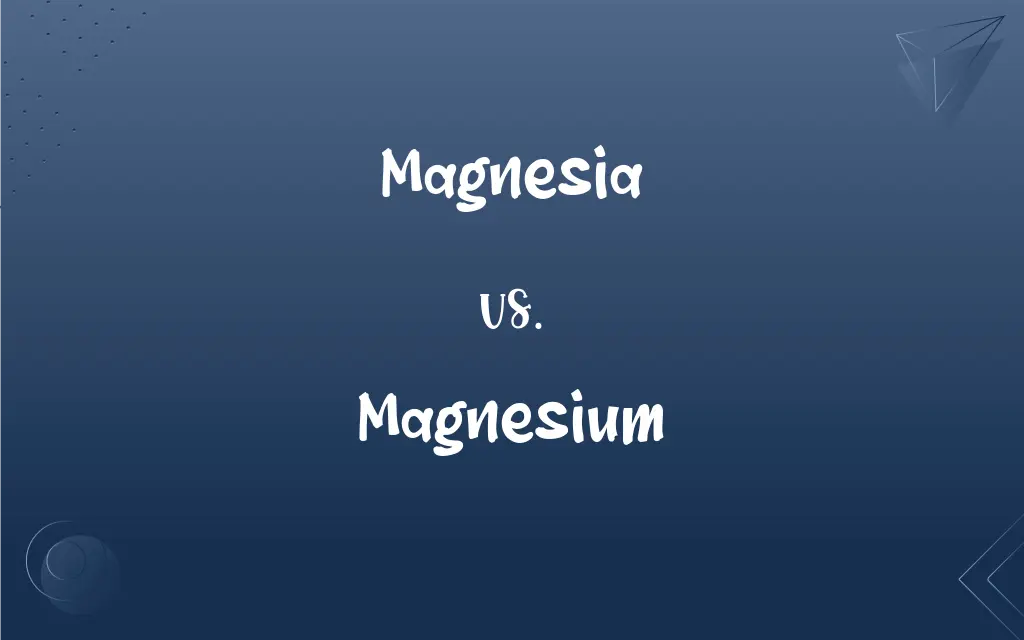Magnesia vs. Magnesium: What's the Difference?
Edited by Aimie Carlson || By Janet White || Published on December 7, 2023
Magnesia is a compound of magnesium, often used as an antacid and laxative, while magnesium is a chemical element essential for human health.

Key Differences
Magnesia, typically referring to magnesium oxide, is a white powder used for medicinal purposes, such as treating stomach acidity and constipation. Magnesium, on the other hand, is a silver-white metallic element, crucial in biology and industry.
Magnesia acts as an antacid and laxative due to its chemical properties that neutralize stomach acid and increase water in the intestines. Magnesium, as an element, is a vital nutrient involved in numerous bodily functions including muscle and nerve function, blood glucose control, and protein synthesis.
Magnesia is often consumed in medicinal forms like tablets or suspension. Magnesium, however, is consumed through diet and supplements and is a component of various enzymes and hormones.
The medicinal uses of magnesia are well-known in treating specific conditions. Magnesium, in its elemental or compound form, is used in diverse industries ranging from alloy production to electronics.
Magnesia primarily offers health benefits in addressing digestive issues, while magnesium's role is broader, contributing to overall health, including heart health, bone strength, and energy production.
ADVERTISEMENT
Comparison Chart
Nature
A compound, often magnesium oxide
A chemical element (atomic number 12)
Use in Health
Used as an antacid and laxative
Essential nutrient for bodily functions
Form
Consumed in medicinal forms
Found in foods, supplements
Applications
Mainly medicinal for digestive issues
Broad, including health and industry uses
Health Benefits
Alleviates stomach acidity, constipation
Supports muscle/nerve function, bone health
ADVERTISEMENT
Magnesia and Magnesium Definitions
Magnesia
Magnesia is magnesium oxide, used as a medicinal antacid and laxative.
She took magnesia to relieve her heartburn.
Magnesium
Found in foods like nuts, seeds, and green leafy vegetables.
Eating spinach is a good way to get dietary magnesium.
Magnesia
A white powder used for treating digestive issues.
Magnesia can be effective for occasional constipation.
Magnesium
Involved in over 300 enzymatic reactions in the human body.
Magnesium plays a crucial role in energy metabolism.
Magnesia
Magnesia is used in its compound form for specific health issues.
Her doctor recommended magnesia for her indigestion.
Magnesium
Magnesium compounds are used in medicine, agriculture, and manufacturing.
Magnesium sulfate is used both as a fertilizer and a medicinal compound.
Magnesia
Often found in over-the-counter digestive remedies.
I found magnesia in the pharmacy's digestive aids section.
Magnesium
Magnesium is a vital dietary mineral essential for many bodily functions.
Magnesium is important for maintaining healthy bones.
Magnesia
Magnesia neutralizes stomach acid and increases bowel movements.
To combat acid reflux, he used a dose of magnesia.
Magnesium
A silver-white metallic element used in various industries.
Magnesium alloys are used in aerospace engineering.
Magnesia
See magnesium oxide.
Magnesium
A light, silvery-white, moderately hard metallic element that in ribbon or powder form burns with a brilliant white flame. Obtained chiefly from magnesite, dolomite, and bodies of salt water, it is used in structural alloys, pyrotechnics, flash photography, and incendiary bombs. Atomic number 12; atomic weight 24.305; melting point 650°C; boiling point 1,090°C; specific gravity 1.738 (at 20°C); valence 2. See Periodic Table.
Magnesia
(mineral) magnesium oxide
Magnesium
The chemical element (symbol Mg) with an atomic number of 12. It is a light, easily flammable, silvery-white alkaline earth metal.
Magnesia
A light earthy white substance, consisting of magnesium oxide (MgO), and obtained by heating magnesium hydrate or carbonate, or by burning magnesium. It has a slightly alkaline reaction, and is used in medicine as a mild antacid laxative. See Magnesium.
Magnesium
A light silver-white metallic element of atomic number 12, malleable and ductile, quite permanent in dry air but tarnishing in moist air. It burns, forming (the oxide) magnesia, with the production of a blinding light (the so-called magnesium light) which is used in signaling, in pyrotechny, or in photography where a strong actinic illuminant is required. Its compounds occur abundantly, as in dolomite, talc, meerschaum, etc. Symbol Mg. Atomic weight, 24.305. Specific gravity, 1.75.
Magnesia
A white solid mineral that occurs naturally as periclase; a source of magnesium
Magnesium
A light silver-white ductile bivalent metallic element; in pure form it burns with brilliant white flame; occurs naturally only in combination (as in magnesite and dolomite and carnallite and spinel and olivine)
FAQs
What are the health benefits of magnesium?
Supports muscle function, bone health, and energy production.
What foods are high in magnesium?
Green leafy vegetables, nuts, seeds, and whole grains.
What role does magnesium play in the body?
It's essential for nerve transmission, muscle contraction, and many other functions.
Is magnesia effective for long-term constipation relief?
It's usually recommended for short-term relief; long-term use requires medical advice.
Can magnesia be taken with other medications?
Consult a doctor, as it may interact with certain medications.
Is magnesia safe for children?
Consult a pediatrician before use, as it depends on age and condition.
How does magnesia relieve acid reflux?
By neutralizing stomach acid.
What is magnesia used for?
Primarily as an antacid and laxative.
Can magnesia be used daily?
It's typically for occasional use; frequent use should be discussed with a doctor.
Can taking magnesia lead to side effects?
Yes, possible side effects include diarrhea and abdominal cramping.
Can magnesium help with sleep?
Yes, it can aid in relaxation and improve sleep quality.
What are common signs of magnesium deficiency?
Muscle cramps, fatigue, and irregular heartbeat.
Can magnesium improve exercise performance?
It can aid in muscle function and energy production during exercise.
Are magnesium supplements necessary?
They can be for some individuals, but it's best to consult a healthcare provider.
Does magnesia impact kidney function?
People with kidney issues should consult a doctor before use, as it can affect kidney function.
How does magnesium affect heart health?
It helps regulate blood pressure and supports heart muscle function.
Are there industrial uses for magnesium?
Yes, in alloys, electronics, and manufacturing processes.
Is magnesia a natural product?
Magnesia, as magnesium oxide, is a compound created from natural magnesium.
How much magnesium should one consume daily?
The recommended daily amount varies by age, gender, and health conditions.
Does cooking affect magnesium content in food?
Some magnesium can be lost during cooking, especially in water.
About Author
Written by
Janet WhiteJanet White has been an esteemed writer and blogger for Difference Wiki. Holding a Master's degree in Science and Medical Journalism from the prestigious Boston University, she has consistently demonstrated her expertise and passion for her field. When she's not immersed in her work, Janet relishes her time exercising, delving into a good book, and cherishing moments with friends and family.
Edited by
Aimie CarlsonAimie Carlson, holding a master's degree in English literature, is a fervent English language enthusiast. She lends her writing talents to Difference Wiki, a prominent website that specializes in comparisons, offering readers insightful analyses that both captivate and inform.








































































